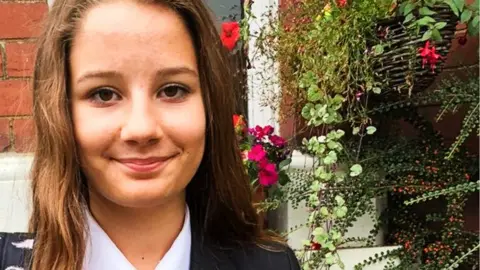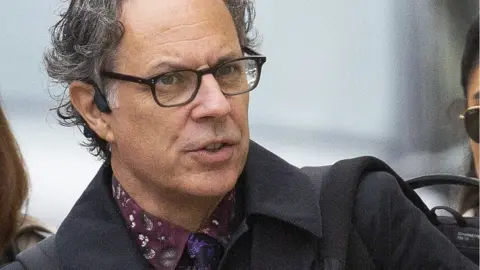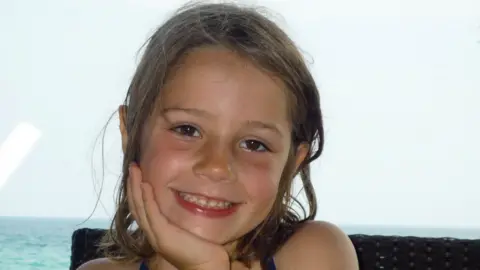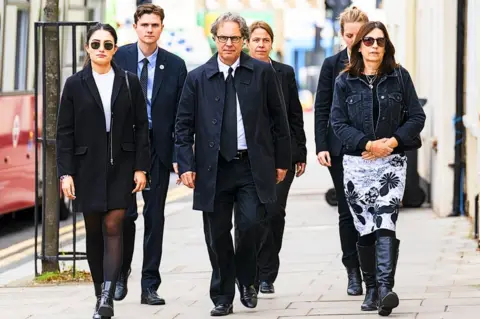Molly Russell inquest: Father makes social media plea
 Russell family
Russell familyThe father of 14-year-old Molly Russell has called for urgent changes to make children safer online after an inquest found social media content contributed "more than minimally" to her death.
Coroner Andrew Walker concluded Molly, from Harrow, died from an act of self-harm while suffering depression and the negative effects of online content.
He said the images of self-harm and suicide she viewed "shouldn't have been available for a child to see".
Molly took her own life in 2017.
After the hearing finished on Friday, Molly's father Ian Russell said: "It's time to protect our innocent young people instead of allowing [social media] platforms to prioritise their profits by monetising the misery of children."
'Incredibly brave'
In a statement, NSPCC chief executive Sir Peter Wanless said: "This should send shockwaves through Silicon Valley - tech companies must expect to be held to account when they put the safety of children second to commercial decisions.
"The magnitude of this moment for children everywhere cannot be understated."
Further reaction to the inquest's findings came from the Prince of Wales.
"No parent should ever have to endure what Ian Russell and his family have been through," he said in a statement.
"They have been so incredibly brave. Online safety for our children and young people needs to be a prerequisite, not an afterthought."
 PA Media
PA MediaMr Walker, the senior coroner for north London, said Molly appeared a healthy girl who was flourishing at school, having settled well into secondary school life, and displayed an enthusiastic interest in the performing arts.
However, Molly had become depressed, something common in children of this age, the coroner said.
The inquest was told her condition worsened into a depressive illness.
Mr Walker told North London Coroner's Court: "It would not be safe to leave suicide as a conclusion.
"She died from an act of self-harm while suffering from depression and the negative effects of online content."
His narrative conclusion continued: "Molly subscribed to a number of online sites. She had access to images, video clips and text concerned with self-harm and suicide, or that were otherwise negative or depressing in nature."
'Life-sucking content'
He said that Instagram and Pinterest used algorithms that resulted in there being "binge periods" of material, some of which was selected and provided for Molly without her having requested it.
"These binge periods are likely to have had a negative effect on Molly. Some of this content romanticised acts of self-harm by young people on themselves. Other content sought to isolate and discourage discussion with those who may have been able to help.
"It is likely that the above material viewed by Molly, already suffering with a depressive illness and vulnerable due to her age, affected her mental health in a negative way and contributed to her death in a more than minimal way."
 Russell family
Russell familyMr Walker said: "In some cases, the content was particularly graphic, tending to portray self-harm and suicide as an inevitable consequence of a condition that could not be recovered from.
"The sites normalised her condition, focusing on a limited and irrational view without any counterbalance of normality."
The coroner will compile a report outlining his concerns. He is to write to Pinterest and Instagram's parent company Meta, as well as the government and Ofcom.

- If you've been affected by self-harm or emotional distress, help and support is available via the BBC Action Line

After the inquest into his daughter's death ended, Molly's father said: "This past fortnight has been particularly painful for our family; we're missing Molly more agonisingly than usual, but we hope that the scrutiny this case has received will help prevent similar deaths encouraged by the disturbing content that is still to this day available on social media platforms, including those run by Meta.
"If this demented trail of life-sucking content was safe, my daughter Molly would probably still be alive and instead of being a bereaved family of four, there would be five of us looking forward to a life full of purpose and promise that lay ahead for our adorable Molly.
"It's time the toxic corporate culture at the heart of the world's biggest social media platform changed.
"It's time for the government's Online Safety Bill to urgently deliver its long-promised legislation.
"It's time to protect our innocent young people, instead of allowing platforms to prioritise their profits by monetising their misery."

BBC News correspondent Angus Crawford, from North London Coroner's Court
Ian Russell always claimed that social media helped kill Molly; today a coroner agreed.
There have been two weeks of what one witness described as "deeply disturbing, deeply distressing" evidence.
The inquest was only shown a small sample of the thousands of images that algorithms served up to Molly - dark, miserable and depressing, of nooses, pills and razor blades.
Before the videos found on the 14-year-old's Instagram account were played in court, the coroner warned that they were almost impossible to watch. A member of his staff had to leave the room while they were viewed.
In a first for both Meta, which owns Instagram, and the picture-sharing site Pinterest, senior executives gave evidence under oath in a court in the UK.
Meta's Elizabeth Lagone came with bodyguards each day. They used decoy vehicles and at one point a photographer was manhandled, all in an effort to avoid press waiting outside the court.
The Russell family were visibly moved as coroner Andrew Walker read out his conclusions.
At a later press conference, Mr Russell was on the edge of tears as he concluded his remarks by paying tribute to Molly - thanking her for being his daughter.

The inquest had heard how Molly accessed thousands of social media posts on Instagram and Pinterest that were related to depression, self-harm and suicide in the months before she died. She also reached out to celebrities on Twitter with pleas for support, not realising they were unlikely to notice her messages, let alone reply.
The head of health and wellbeing at Meta, Elizabeth Lagone, and Pinterest's head of community operations, Judson Hoffman, appeared in person to give evidence during the teenager's inquest. Mr Hoffman conceded Pinterest was "not safe" when Molly used it, and said he "deeply regrets" some of the content the teenager viewed.
Ms Lagone said posts described by the Russell family as "encouraging" suicide or self-harm were safe, but conceded a number of posts shown to the court would have violated Instagram's policies.
 PA Media
PA MediaAs he spoke to the media about his daughter's death, Mr Russell said: "In the last week we've heard much about one tragic story - Molly's story. Sadly, there are too many others similarly affected right now.
"At this point I just want to say however dark it seems, there is always hope, and if you're struggling please speak to someone you trust or one of the many wonderful support organisations, rather than engage with online content that may be harmful.
"Please do what you can to live long and stay strong."

- Following the conclusion of the inquest, a spokeswoman for Meta said the company was "committed to ensuring that Instagram is a positive experience for everyone, particularly teenagers" and that it would "carefully consider the coroner's full report when he provides it".
- During the inquest, Pinterest executive Judson Hoffman told the court that the platform "should be safe for everyone", and accepted that "there was content that should have been removed that was not removed" when Molly was using it.
- Secretary of State for Digital, Culture, Media and Sport Michelle Donelan said in a statement: "The inquest has shown the horrific failure of social media platforms to put the welfare of children first."
- She added: "We owe it to Molly's family to do everything in our power to stop this happening to others. Our Online Safety Bill is the answer and through it we will use the full force of the law to make social media firms protect young people from horrendous pro-suicide material."

Follow BBC London on Facebook, Twitter and Instagram. Send your story ideas to [email protected]
